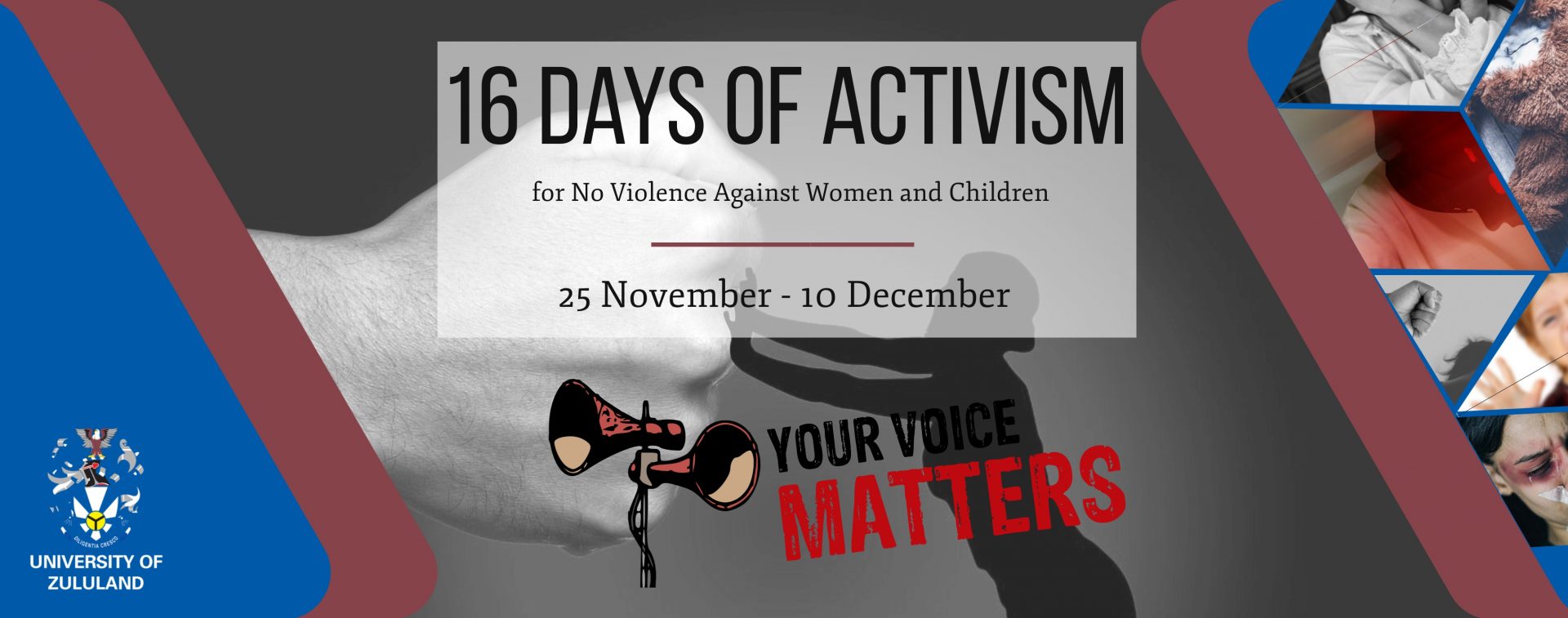OPINION PIECE : 16 Days of Activism Against Gender Based Violence: Novel approaches for Higher Education

The COVID-19 pandemic has brought unprecedented disruptions to academic, socio-politico and economic life of South Africa —increasing poverty and food insecurity as well as obliterating gains in employment, accrued over the last decade. Most notably, the COVID-19 pandemic has put into sharp focus the endemic scrouge of Gender-Based Violence (GBV) in South African society. Rates of gender-based violence in South Africa are among the highest in the world and pose an immense challenge to the progressive realisation of the central values of the Bill of Rights enshrined in the Constitution of South Africa: human dignity, the healing of the wounds of the nation, social justice, freedom, and equality.
The total of reported sexual offenses in 2020 was 60,617. These numbers paint a morbid picture of gender-based violence in South Africa, especially when compared with the figures for murder and attempted murder, which are between 16,000 and 17,000 per year (Crime Statistics South Africa, 2020). Whilst people of all genders perpetrate and experience intimate partner and or sexual violence, men are most often the perpetrators and women and children the victims (Crime Statistics South Africa, 2020). More than half of all the women murdered (56%) in 2020 were killed by an intimate male partner. Between 25% and 40% of South African women have experienced sexual and/or physical intimate partner violence in their lifetime (Crime Statistics South Africa, 2020). In addition, just under 50% of women report having ever experienced emotional or economic abuse at the hands of their intimate partners in their lifetime (Crime Statistics South Africa, 2020).
Gender-based violence is a multidimensional problem, and isolating the root causes is well-nigh impossible, making developing effective prevention programmes and interventions equally difficult to achieve. In University’s across the country the situation is also concerning because of the recent gruesome murder of students at Fort Hare and UCT that has highlighted that incisive programmes and initiatives are urgently required.
In light of the Fort Hare and UCT experiences, the Office for Transformation & Social Inclusion at UNIZULU has used the 16 Days of activism campaign to galvanise our partners in civil society to play an active role in driving programmes and campaigns in the new academic year. This approach is informed by the fact that the prevailing context of South Africa, activism against GBV should be a 365 Day campaign. In South Africa in particular, gender-based violence pervades the political, economic and social structures of society and is driven by strongly patriarchal social norms and complex and intersectional power inequalities, including those of gender, race, class and sexuality. In response to this the Transformation Office will partner with the GoodMen Foundation in the University’s #HEforSHe campaign, during men’s month, to ensure that men across the UNIZULU community understand the active role that they have to play in pursuing gender equity and equality.
Lastly, what is equally worrying is that gender-based violence is an important risk factor for mental health problems among adult women in South Africa. A major obstacle for integrating mental health gender-based violence prevention initiatives into South African health programmes and primary healthcare services is lack of consensus on a definition of mental health. There is little agreement on a general definition of ‘mental health’ and currently there is widespread use of the term ‘mental health’ as a euphemism for ‘mental illness’.
The 2019 South Africa Human Rights Commission’s report on the status of mental health services should cause all of us to pause and reflect on what needs to be done to provide quality, rights-based mental health services for the people of South Africa.
- One in six South Africans suffer from anxiety, depression, or substance-use disorders.
- 40% of South Africans with HIV suffer from a mental disorder.
- 41% of pregnant women are depressed.
- Only 27% of South Africans with severe mental disorders receive treatment.
The situation of mental health in South Africa is troubling and urgent action is needed. This means that a national movement is urgently needed. In addition, there is neglect, mismanagement, as well as under-funding of mental health services (The South African Human Rights Commission, 2018). Further, about 50 per cent of mental health problems in South Africa are caused by gender-based violence (Bantjes, Swartz and Niewoudt, 2017). People who live in rural areas, the poorly educated, and the unemployed had poorer psychological well-being caused by gender-based violence (Khumalo, Temane and Wissing, 2012). Adult women in the general population who have experienced intimate partner violence and rape have a much higher prevalence of depression, post-traumatic stress disorder, binge drinking and suicidal thoughts and attempts. Adolescent women without mental health morbidity exposed to physical or sexual intimate partner violence were significantly more likely to develop depression, to develop stress, alcohol use disorders, low self-esteem, feelings of hopelessness or suicidal thoughts (The Stepping Stones Study cohort, 2018). In light of this reality UNIZULU is exploring novel mechanism and partnerships with platforms such as Cloud Therapist, a digital mental health platform, to provide our students with tools and psychological assistance that they require. We recognise that the fight against GBV and its effects requires new approaches and tools.
UNIZULU recognizes that mental health interventions can and should be incorporated into gender-based violence primary prevention efforts at every level including creating change at the individual, relational/interpersonal, community, and societal levels that are overlapping. There is an urgent need to support the implementation of mental health interventions. Many actors, including government, civil society, and funders, as well as community members, should working in creative and innovative ways to address the impact of gender-based violence on mental health on campuses across the country.
Menzi M. Bhengu – Manager: Transformation and Social Inclusion














Leave a Reply